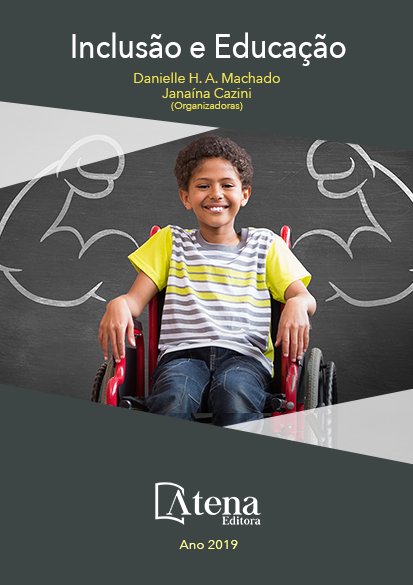
UMA REFLEXÃO SOBRE A POLITICA EDUCACIONAL INCLUSIVA NO BRASIL
O sistema educacional brasileiro
tem se esforçado na tentativa de implementar
políticas públicas eficazes no que diz respeito
a garantia de acesso e atendimento dos alunos
público alvo da educação especial. Porém,
inserir esse aluno na sala de aula regular não
significa incluí-lo e não assegura seus direitos
de igualdade educacional. Este estudo teve
como objetivo apresentar os principais aspectos
propostos pelo Ministério da Educação
oportunizando uma reflexão crítica sobre o
atual panorama nacional da educação inclusiva
na Brasil. A pesquisa foi caracterizada como
qualitativa e teve como base o levantamento
bibliográfico de autores e documentos que tratam
o tema. A principal análise foi fundamentada na
legislação, publicada em forma de normativas
e resoluções, pelo Ministério da Educação, tais
como: Lei de Diretrizes e Bases da Educação
Brasileira. (1996), Plano Nacional de Educação
(2001), Política Nacional de Educação Especial
na Perspectiva da Educação Inclusiva (2008).
Ao propor um ensino que respeite as limitações
individuais, que considere as diferenças e que
oportunize as mesmas chances de aprendizado
para todo e qualquer aluno, é preciso lembrar
que significativas mudanças de paradigmas
são necessárias. O próprio termo “público
alvo da educação especial” é excludente.
Definir, sem critérios claros, quem tem direito
ao atendimento educacional especializado,
marginaliza-se, novamente, um outro grupo.
Concluímos que a sociedade passa por um
processo de adaptação no qual a inclusão
educacional tem sofrido constantes ajustes,
envolvendo várias esferas, na tentativa de
acolher e incluir de forma igualitária os alunos
público alvo da educação especial no sistema
regular de ensino.
UMA REFLEXÃO SOBRE A POLITICA EDUCACIONAL INCLUSIVA NO BRASIL
-
DOI: 10.22533/at.ed.29219150120
-
Palavras-chave: Educação. Inclusão Educacional. Educação Especial.
-
Keywords: Education. Educational Inclusion. Special Education
-
Abstract:
The Brazilian educational system
has been trying to implement effective public
policies regarding the guarantee of access
and attendance of the target public students
of special education. However, just entering
this student in the regular classroom does not
mean enrolling and does not ensure your equal
educational rights. This study aimed to present
the main aspects proposed by the Ministry of
Education, providing a critical reflection on the current national panorama of inclusive
education in Brazil. The research was characterized as qualitative and was based
on a bibliographical survey of authors and documents that deal with the theme. The
main analysis was based on legislation, published in the form of regulations and
resolutions, by the Ministry of Education, such as: Law of Guidelines and Bases of
Brazilian Education. (1996), National Education Plan (2001), National Policy on Special
Education in the Perspective of Inclusive Education (2008). By proposing a teaching that
respects individual limitations, considers differences, and provides the same learning
opportunities for each and every student, we must remember that significant paradigm
shifts are necessary. The very term “target audience of special education” is exclusive.
Defining, without clear criteria, who has the right to specialized educational services,
another group is marginalized again. We conclude that the society undergoes an
adaptation process in which educational inclusion has undergone constant adjustments,
involving several spheres, in an attempt to welcome and equitably include the target
public of the special education in the regular system of education.
-
Número de páginas: 15
- Simone Aparecida Capellini


